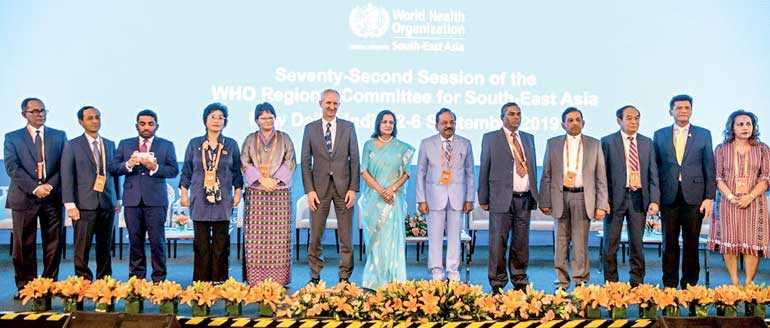Thursday Feb 26, 2026
Thursday Feb 26, 2026
Friday, 6 September 2019 00:00 - - {{hitsCtrl.values.hits}}

Member Countries of WHO South-East Asia Region yesterday resolved to eliminate measles and rubella by 2023, to prevent deaths and disabilities caused by these highly-infectious childhood killer diseases.
“The new target to eliminate both the diseases will leverage the existing momentum and strong political commitment which is being demonstrated through unprecedented efforts, progress and successes in recent years,” said Dr. Poonam Khetrapal Singh, Regional Director WHO South-East Asia, as a resolution to eliminate the two diseases was adopted at the Seventy-Second Session of WHO Regional Committee for South-East Asia in New Delhi.
Measles elimination and rubella control has been a regional flagship priority since 2014. Five countries have eliminated measles – Bhutan, DPR Korea, Maldives, Sri Lanka and Timor-Leste. Six countries have controlled rubella – Bangladesh, Bhutan, Maldives, Nepal, Sri Lanka and Timor-Leste.
To achieve the new targets, the Member countries resolved to strengthen immunization systems for increasing and sustaining high level of population immunity against measles and rubella at both national and sub-national levels.
The resolution calls for ensuring a highly sensitive laboratory supported case-based surveillance system – better evidence for appropriate planning and response. It also emphasises on preparedness for outbreak response activities for measles and rubella.
All countries pledged to mobilise political, societal and financial support to ensure interruption of transmission of indigenous measles and rubella virus by 2023.
The Member countries adopted a ‘Strategic Plan for Measles and Rubella Elimination 2020-2024’ that lays down the road map and focus areas to achieve the elimination targets in the Region.
“Eliminating measles will prevent 500,000 deaths a year in the Region, while eliminating rubella/CRS would avert about 55,000 cases of rubella and promote health and well-being of pregnant woman and infants,” the Regional Director said.
The drive against measles and rubella/CRS gathered crucial momentum after 2014, when ‘Measles Elimination and Rubella/CRS Control by 2020’ was declared one of the eight Flagship Priority programmes for the Region and a Regional Strategic Plan was implemented across the Member States.
There has been a 23% decline in mortality due to measles in the 2014-17 period. Nearly 366 million children have been reached through mass vaccination campaigns with measles-rubella (MR) containing vaccines in the Region since January 2017.
Children in all 11 Member countries have access to two doses of measles containing vaccine (MCV) and 10 countries have access to rubella-containing vaccine.
The decision to revise the targets of measles and rubella elimination was preceded by several consultations, including during the WHO South-East Asia Regional Immunization Technical Advisory Group meeting in July 2019. The WHO Regional Office for South-East Asia also conducted high-level consultations, in March 2019, with Member States on the feasibility of adopting the new target.
Measles is particularly dangerous for the poor, as it attacks malnourished children and those with reduced immunity. Measles can cause serious complications, including blindness, encephalitis, severe diarrhoea, ear infection and pneumonia while rubella/congenital rubella syndrome (CRS) causes irreversible birth defects.